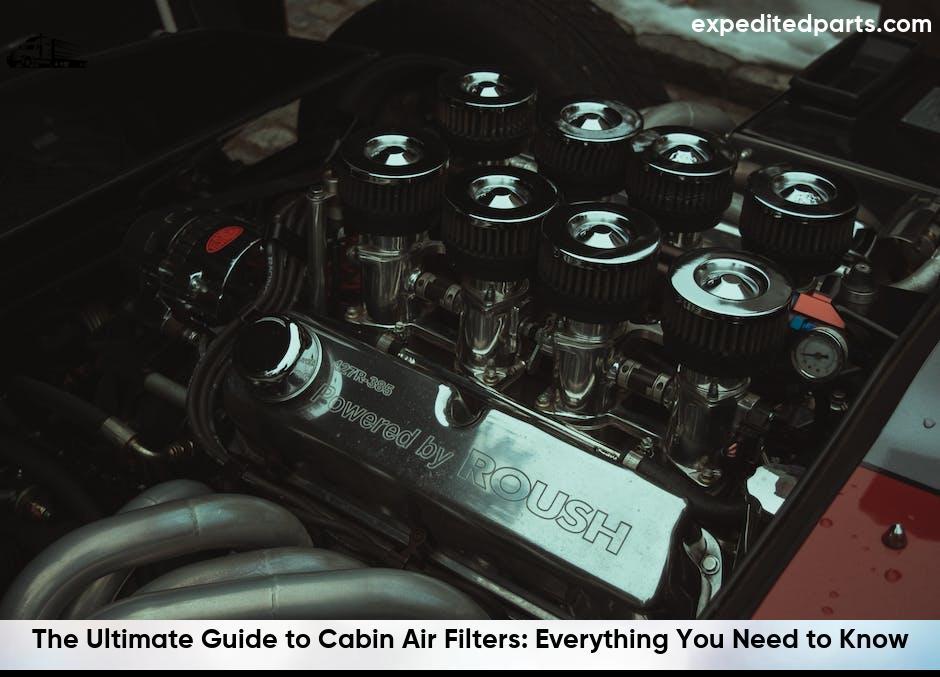Breathing clean air is vital for your well-being. Don’t overlook the importance of cabin air filters. They trap allergens and pollutants, keeping you safe and comfortable inside your vehicle. Your health matters.
Cabin air filters play a vital role in ensuring the air quality inside a vehicle’s cabin remains clean and healthy. These filters are designed to trap and remove dust, pollen, smoke, and other airborne particles, preventing them from entering the cabin and affecting the occupants’ well-being. By filtering the air that enters the vehicle through the HVAC (heating, ventilation, and air conditioning) system, cabin air filters help reduce allergies, respiratory issues, and unpleasant odors. Regularly replacing cabin air filters is crucial to maintain optimum air quality and protect the health of those inside the vehicle. With the increasing awareness of air pollution and its impact on health, cabin air filters have become an essential component for ensuring a comfortable and safe driving experience.
For detailed information, you can contact us: Torque

The Ultimate Guide to Cabin Air Filters: Everything You Need to Know
The Ultimate Guide to Cabin Air Filters is a comprehensive resource that provides you with all the essential information you need to know about cabin air filters. Whether you are a car owner or a professional in the automotive industry, understanding the importance of cabin air filters is crucial for maintaining healthy air quality inside your vehicle.
In this guide, we will walk you through the basics of cabin air filters, their function, and why they are important for your overall well-being. We will also provide you with step-by-step instructions on how to replace your cabin air filter, ensuring that you can keep the air inside your vehicle clean and fresh.
Here is a breakdown of what you will learn in this comprehensive guide:
- What is a Cabin Air Filter?: Discover what a cabin air filter is and how it works to keep the air inside your vehicle free from pollutants.
- Importance of Cabin Air Filters: Learn why cabin air filters are essential for your health and the well-being of your passengers.
- Signs of a Dirty or Clogged Cabin Air Filter: Understand the warning signs that indicate it’s time to replace your cabin air filter.
- How to Replace a Cabin Air Filter: Follow our step-by-step guide to properly replace your cabin air filter and ensure optimal air quality inside your vehicle.
- Maintenance and Care Tips: Discover valuable tips for maintaining and prolonging the lifespan of your cabin air filter.
Why Cabin Air Filters Are Essential for Healthy Breathing
Cabin air filters play a vital role in ensuring healthy breathing and maintaining clean air inside your vehicle. Understanding why cabin air filters are essential can help you prioritize their maintenance and replacement, ultimately benefiting your overall well-being and the health of your passengers.
In this informative article, we will delve into the significance of cabin air filters and why they are crucial for your respiratory health. Here are the key points we will cover:
- Protection from Pollutants: Cabin air filters act as a barrier, preventing harmful particles, dust, pollen, and other pollutants from entering the interior of your vehicle.
- Improving Air Quality: A clean cabin air filter ensures fresh and clean air inside your vehicle, reducing the risk of respiratory issues and allergies caused by airborne contaminants.
- Enhancing HVAC System Performance: A clogged or dirty cabin air filter can restrict airflow, causing strain on your HVAC system. Regular replacement of cabin air filters can optimize the efficiency and performance of your vehicle’s heating and cooling system.
- Reducing Odors and Unpleasant Smells: Cabin air filters help remove odors from the air inside your vehicle, creating a more pleasant and comfortable driving environment.
Understanding the importance of cabin air filters and their impact on your health is the first step towards maintaining a clean and healthy vehicle interior. Regularly replacing your cabin air filter will not only benefit your respiratory health but also contribute to a more enjoyable and refreshing drive.
How to Choose the Right Cabin Air Filter for Your Vehicle
Choosing the right cabin air filter for your vehicle is important for maintaining good air quality inside your car. Here are some steps to follow when selecting the right cabin air filter:
| Step | Description |
|---|---|
| 1 | Consult your vehicle’s manual to determine the specific type and size of cabin air filter required for your car. Different car models may have different filter specifications. |
| 2 | Consider the filter material. Cabin air filters can be made of various materials, such as paper, foam, or activated charcoal. Each material has its own benefits. Paper filters offer basic filtration, foam filters offer improved dust and pollen protection, while activated charcoal filters provide enhanced odor removal. |
| 3 | Check the filter efficiency rating. Filters with higher efficiency ratings can capture finer particles, such as allergens and pollutants, effectively improving the air quality inside your vehicle. |
| 4 | Verify the filter compatibility. Ensure that the filter you choose is compatible with your vehicle’s make, model, and year. Incorrectly fitting filters may not provide proper filtration or airflow. |
| 5 | Consider the brand and quality. Opt for reputable brands that are known for their reliable cabin air filters. High-quality filters tend to last longer and perform better. |
| 6 | Review customer reviews and ratings. Reading reviews from other car owners can give you insights into the performance and durability of different cabin air filter options. |
The Benefits of Regularly Changing Your Cabin Air Filter
Regularly changing your cabin air filter can bring several benefits to both you and your vehicle. Here are some advantages of maintaining a regular cabin air filter replacement schedule:
- Improved air quality: A clean cabin air filter ensures that the air entering your vehicle’s interior is free from dust, pollen, pollutants, and other airborne particles. This helps to prevent respiratory issues and allergies, ensuring a healthier environment for you and your passengers.
- Enhanced HVAC system performance: A clogged or dirty cabin air filter can reduce the airflow to your vehicle’s heating, ventilation, and air conditioning (HVAC) system. By regularly changing the filter, you can maintain proper airflow and allow the HVAC system to function optimally.
- Reduced foul odors: A dirty cabin air filter can result in unpleasant odors inside your vehicle. By replacing the filter regularly, you can eliminate these odors and enjoy a fresh-smelling interior.
- Improved defrosting and demisting: A clean cabin air filter helps to maintain clear windows by preventing the build-up of fog, condensation, and frost. This ensures better visibility and safer driving conditions.
Top Signs It’s Time to Replace Your Cabin Air Filter
When it comes to maintaining your vehicle, there are some parts that often go unnoticed. One such part is the cabin air filter. The cabin air filter plays a crucial role in keeping the air inside your vehicle clean and free from pollutants. Over time, however, this filter can become clogged and ineffective. This is why it’s important to know the signs that indicate it’s time to replace your cabin air filter.
- 1. Reduced airflow: One of the first signs that your cabin air filter needs replacement is reduced airflow into the cabin. If you notice that the air coming out of your vents is weaker than usual, it could be due to a dirty or clogged filter.
- 2. Unpleasant odors: Another common sign is the presence of unpleasant odors inside the vehicle. A dirty or worn-out cabin air filter can allow dust, pollen, and other particles to accumulate, leading to a musty or foul smell.
- 4. Poor defrosting or defogging: A clogged cabin air filter can also affect your vehicle’s defrosting or defogging capabilities. If you notice that your windows take longer to clear up or that they remain foggy even after using the defogger, it might be time to replace the filter.
- 5. Noisy fan or unusual smells from the vents: A worn-out or clogged cabin air filter can put additional strain on the HVAC system, causing the fan to work harder and create more noise. Unusual smells coming from the vents, such as a burning or musty odor, can also be indicative of a failing filter.
Regularly replacing your cabin air filter is essential to maintain good air quality inside your vehicle and ensure the efficient operation of your HVAC system. It is recommended to consult your vehicle’s owner manual or seek professional advice to determine the specific replacement interval for your cabin air filter.
Debunking Common Myths About Cabin Air Filters
Cabin air filters play a vital role in keeping the air inside your vehicle clean and free from pollutants. However, there are several myths surrounding cabin air filters that can lead to misconceptions about their importance and maintenance. Let’s debunk some of these common myths:
| Myth | Fact |
|---|---|
| 1. Cabin air filters only need replacement if they are visibly dirty. | Fact: Visible dirt or debris is not the sole indicator of a cabin air filter needing replacement. Filters can become clogged and less effective even without visible dirt. |
| 2. Cabin air filters only filter out dust and pollen. | |
| 3. All cabin air filters are the same. | Fact: Cabin air filters come in different types and efficiencies. It’s important to choose a filter that is compatible with your vehicle and meets the manufacturer’s specifications. |
| 4. Cabin air filters only need replacement every few years. | Fact: The replacement interval for cabin air filters varies depending on factors like driving conditions, air quality, and the vehicle manufacturer’s recommendations. It is generally recommended to replace the filter every 12,000 to 15,000 miles or once a year. |
| 5. A cabin air filter doesn’t affect the performance of the HVAC system. | Fact: A clogged or dirty cabin air filter can restrict airflow and put strain on the HVAC system, leading to reduced cooling or heating efficiency and increased energy consumption. |
By debunking these common myths, it becomes clear that proper maintenance and regular replacement of cabin air filters are essential for ensuring clean and fresh air inside your vehicle, as well as optimizing the performance of your HVAC system.


